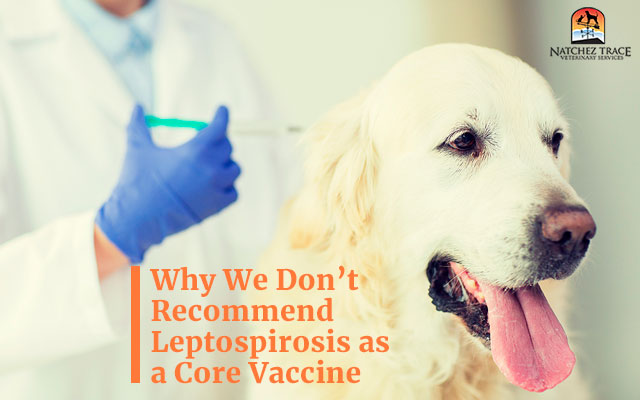One topic we’re often asked about is the leptospirosis core vaccine. As of 2024, the American Animal Hospital Association (AAHA) now classifies it as a core vaccine recommended for all dogs regardless of lifestyle.
So why don’t we follow suit?
The answer lies in the details and the disclaimers. From our holistic perspective, recommending the leptospirosis vaccine for all dogs regardless of lifestyle, health history, or risk amounts to overvaccination. While broad guidelines aim to simplify prevention, a one-size-fits-all approach can have unintended consequences. Overvaccinating can burden the immune system, trigger chronic inflammation, or contribute to long-term sensitivities, especially in senior pets or those with underlying health issues. We believe in protecting your pet without overwhelming their system, and that means vaccinating only when truly needed, not as a blanket policy.
Understanding Our Integrative Approach to Canine Care
At Natchez Trace Veterinary Services, we practice integrative veterinary medicine—combining evidence-based science with holistic, individualized  care. This means we look at your dog as a whole being, not just a protocol to follow. We assess lifestyle, environment, immune health, and your pet’s unique constitution before making any medical recommendation, including vaccines.
care. This means we look at your dog as a whole being, not just a protocol to follow. We assess lifestyle, environment, immune health, and your pet’s unique constitution before making any medical recommendation, including vaccines.
We don’t believe in one-size-fits-all medicine. Leptospirosis is a severe bacterial disease, but not every dog is at a high risk of exposure. For dogs that live primarily indoors, live in low-risk areas, are older, or have chronic health conditions, routine vaccination may not offer a meaningful benefit. It may also place an unnecessary burden on your dog’s immune system.
However, we do carry and administer the leptospirosis vaccine to dogs needing it, such as pets who board frequently, hike near standing water, or live in areas where wildlife exposure is common. We approach vaccination with discernment and respect for each dog’s unique needs.
The Vaccine Only Covers Four Strains
One key limitation we consider is that while there are more than 250 known serovars (strains) of Leptospira, the vaccine used in veterinary medicine typically covers only four: Canicola, Icterohaemorrhagiae, Grippotyphosa, and Pomona. These are the most common strains associated  with canine disease in North America—but they’re not the only ones.
with canine disease in North America—but they’re not the only ones.
Because leptospirosis is evolving and varies by region and wildlife exposure, a dog can contract a strain not covered by the vaccine. Even vaccinated dogs can become infected, and vaccine protection is incomplete. From our integrative perspective, this makes a strong case for focusing on true risk reduction, like immune support, environmental awareness, and early intervention, rather than relying solely on partial coverage through vaccination.
Industry Influence in Vaccine Guidelines
 When AAHA updated its canine vaccination guidelines, it strongly recommended leptospirosis as a core vaccine. You can read the full guidelines here: 2022 AAHA Canine Vaccination Guidelines (Updated 2024).
When AAHA updated its canine vaccination guidelines, it strongly recommended leptospirosis as a core vaccine. You can read the full guidelines here: 2022 AAHA Canine Vaccination Guidelines (Updated 2024).
Then, scroll to the bottom of the page to view the sponsor disclosure. The guidelines are financially supported by the four largest veterinary pharmaceutical companies: Boehringer Ingelheim, Elanco, Merck Animal Health, and Zoetis. All four companies manufacture leptospirosis vaccines.
While financial sponsorship is common in veterinary medicine, it’s important to note that the same companies profiting from increased vaccine use are helping fund the documents recommending it. This doesn’t automatically discredit the content, but from a holistic perspective, it’s a reminder to question how these recommendations are shaped—and whose interests they serve.
“Advertisement” and Editorial Disclaimers
 You may have seen the AAHA NEWStat article promoting the guideline update: NEWStat Article on Lepto Vaccine. This article is labeled as an “ADVERTISEMENT” at the top, signaling that it was most likely sponsored or influenced by industry funding. At the bottom of the page is another very important disclaimer:
You may have seen the AAHA NEWStat article promoting the guideline update: NEWStat Article on Lepto Vaccine. This article is labeled as an “ADVERTISEMENT” at the top, signaling that it was most likely sponsored or influenced by industry funding. At the bottom of the page is another very important disclaimer:
“The views expressed, and topics discussed, in any NEWStat column or article are intended to inform, educate, or entertain, and do not represent an official position by the American Animal Hospital Association (AAHA) or its Board of Directors.”
In other words, while this article may sound authoritative, it is not an official position statement from AAHA and may reflect promotional messaging more than independent clinical guidance.
The Testing Isn’t Perfect Either
 Another reason we take a more measured approach to leptospirosis is that diagnosing it accurately isn’t always straightforward.
Another reason we take a more measured approach to leptospirosis is that diagnosing it accurately isn’t always straightforward.
The most common tests, MAT (Microscopic Agglutination Test) and PCR (Polymerase Chain Reaction), both have limitations:
- MAT, the traditional “gold standard,” can yield false negatives in early infection and cross-react with unrelated serovars, making interpretation difficult.
- PCR is more useful early in infection but is affected by timing and can produce false negatives if antibiotics were started too early or if the organism isn’t being shed in the sampled fluids.
Because the tests are imperfect, we approach every case thoughtfully—balancing risk, symptoms, environment, and individual health history. Again, it comes down to treating the whole animal, not just the numbers.
About the ACVIM Consensus Statement
The 2023 ACVIM Consensus Statement on Leptospirosis in Dogs also influenced AAHA’s update. You can read it here: 2023 ACVIM Consensus Statement on Leptospirosis.
That statement includes a Conflict of Interest Declaration on page 1977:
- One author received funding from Merck Animal Health to support data collection on leptospirosis.
- Another received speaking fees and research support from Elanco, Boehringer Ingelheim, Merck, Zoetis, and IDEXX. All of the companies except IDEXX manufacture leptospirosis vaccines.
These relationships don’t negate the value of the research, but they do matter—especially when the result is a push for wider vaccine use. In holistic medicine, we weigh these influences carefully and always return to what’s best for the individual animal.
Does Every Dog Really Need the Leptospirosis Vaccine?
In 2023, the American College of Veterinary Internal Medicine (ACVIM) released an updated consensus statement on leptospirosis in dogs, recommending that all dogs be vaccinated annually against this bacterial disease—regardless of their breed, lifestyle, location, or medical history.
By 2024, the American Animal Hospital Association (AAHA) followed suit, classifying leptospirosis as a core vaccine, meaning it is now recommended for every dog, every year.
But at our integrative practice, we ask: Is a one-size-fits-all approach the best path forward? We don’t think so, and here’s why.
1. The Vaccine Covers Only 4 Strains
There are more than 250 known serovars (strains) of Leptospira, and over 300 serovars recognized globally. Yet the vaccine only covers four:
Canicola, Icterohaemorrhagiae, Grippotyphosa, and Pomona.
“Currently available bacterins elicit serogroup-specific immunity… Leptospirosis in dogs that have been fully vaccinated… has been documented.”
— ACVIM Consensus Statement, 2023 (Page 1975)
This means the vaccine’s protection is not complete, and vaccinated dogs can still become sick if exposed to a non-covered strain—especially in regions where other serovars may be circulating.
2. “All Dogs Are at Risk”—But Are They Really?
The ACVIM states that all dogs are at risk, regardless of lifestyle or location:
“All dogs are at risk of leptospirosis, regardless of signalment, geographic location, lifestyle, and the time of year.”
— Page 1967
This is a bold claim that doesn’t align with how we evaluate risk in integrative, personalized care. We consider factors like:
- Does your dog have access to wildlife-contaminated water?
- Do they board or attend doggy daycare?
- Do you live in a high-risk region?
- What is their current immune status and medical history?
We don’t believe that a senior, indoor dog in a dry climate should be treated the same as a young, active hunting dog in a wet, wooded region.
3. Diagnostics Aren’t Perfect
It’s also important to understand that diagnosing leptospirosis can be difficult. The statement admits that:
- PCR testing has variable sensitivity, ranging from 21% to 69% depending on the timing and sample type.
- MAT testing is often inconclusive due to cross-reactivity and timing issues.
So even though testing is used to support universal vaccination, the tools we rely on to detect leptospirosis are far from perfect.
Learn more:
4. Overvaccination Is a Real Concern
From a holistic perspective, recommending this vaccine to every dog—regardless of individual need—is a form of overvaccination.
Overvaccinating can:
- Burden the immune system
- Increase risk of chronic inflammation
- Contribute to allergies and hypersensitivities
- Trigger vaccine reactions, particularly in smaller breeds and sensitive individuals
In fact, the ACVIM statement acknowledges that past leptospirosis vaccines contained high protein content, which led to reactions, especially in small dogs. While today’s vaccines are safer, they’re not risk-free—and we believe in using them when truly necessary, not just as routine.
5. Industry Influence Is Part of the Picture
Both the AAHA guidelines and the ACVIM consensus statement were developed with financial support from vaccine manufacturers. The consensus authors disclose funding and speaking relationships with companies such as Merck, Zoetis, Elanco, and Boehringer Ingelheim.
This doesn’t mean the science is invalid, but transparency matters in holistic medicine. We believe in following the science, yes—but also in asking who paid for it, and who benefits when every dog gets the same vaccine.
Questions to Ask Before Saying Yes
If you’re wondering whether your dog needs the leptospirosis vaccine, here are a few questions to consider:
- Does your dog go to areas with standing water, wildlife, or rodents?
- Have you been told which leptospirosis strains are active in your area?
- Has your dog ever had a vaccine reaction or chronic health issue?
- Are you comfortable giving a vaccine offering only partial protection and potential side effects?
- Do you prefer medical decisions based on your dog’s individual needs—not just a universal guideline?
Our Approach
Our clinic offers the leptospirosis vaccine, but we do not recommend it for every dog.
We assess:
- Your dog’s lifestyle and exposure risk
- Your geographic location
- Your dog’s age, breed, health status, and vaccine history
If leptospirosis poses a true risk, we’ll discuss the benefits and drawbacks so you can make a fully informed choice. If your dog is low-risk, we’ll support its health in other ways—through strong immunity, clean living environments, and early recognition of symptoms.
Not every dog needs every vaccine. That’s the heart of integrative, individualized care.
What We Recommend
At Natchez Trace Veterinary Services, we will always consider your dog’s health, risk, history, and lifestyle before making any recommendation.
We:
 Do not recommend the leptospirosis vaccine as a core vaccine for all dogs
Do not recommend the leptospirosis vaccine as a core vaccine for all dogs- Do offer the vaccine for dogs who need it, including those in high-risk environments or with travel/boarding requirements
- Do value transparency, both in science and in our communication with you
- Do believe in empowering pet parents with all the information, not just industry-driven messaging
Integrative care means zooming out: seeing the animal as a whole and weighing all factors, including the source of the guidance we’re being asked to follow.
Schedule Your Appointment Today!
Sources:
- Arent, Z. J., Andrews, S., Adamama-Moraitou, K., Gilmore, C., Pardali, D., & Ellis, W. A. (2012). Emergence of novel Leptospiraserovars: a need for adjusting vaccination policies for dogs? Epidemiology and Infection, 141(6), 1148–1153. https://doi.org/10.1017/s0950268812002087
- Ciurariu, E., Prodan-Barbulescu, C., Mateescu, D., Tutac, P., Sorop, V., Susan, M., & Varga, N. (2025). Diagnostic Advances in Leptospirosis: A Comparative Analysis of Paraclinical Tests with a Focus on PCR. Microorganisms, 13(3), 667. https://doi.org/10.3390/microorganisms13030667
- Leptospira microagglutination testing. (n.d.). Cornell University College of Veterinary Medicine. https://www.vet.cornell.edu/animal-health-diagnostic-center/testing/testing-protocols-interpretations/leptospira-microagglutination-testing
- Leptospirosis in dogs. (n.d.). https://veterinarypartner.vin.com/default.aspx?id=4951453&pid=19239
- Martin, E. A., Heseltine, J. C., & Creevy, K. E. (2022). The evaluation of the diagnostic value of a PCR assay when compared to a serologic Micro-Agglutination test for canine leptospirosis. Frontiers in Veterinary Science, 9. https://doi.org/10.3389/fvets.2022.815103
-
Sykes, J. E., Francey, T., Schuller, S., Stoddard, R. A., Cowgill, L. D., & Moore, G. E. (2023). Updated ACVIM consensus statement on leptospirosis in dogs. Journal of Veterinary Internal Medicine, 37(6), 1966–1982. https://doi.org/10.1111/jvim.16903







